HONDA PASSPORT 2020 (in English) Repair Manual
Manufacturer: HONDA, Model Year: 2020, Model line: PASSPORT, Model: HONDA PASSPORT 2020Pages: 667, PDF Size: 39.71 MB
Page 61 of 667
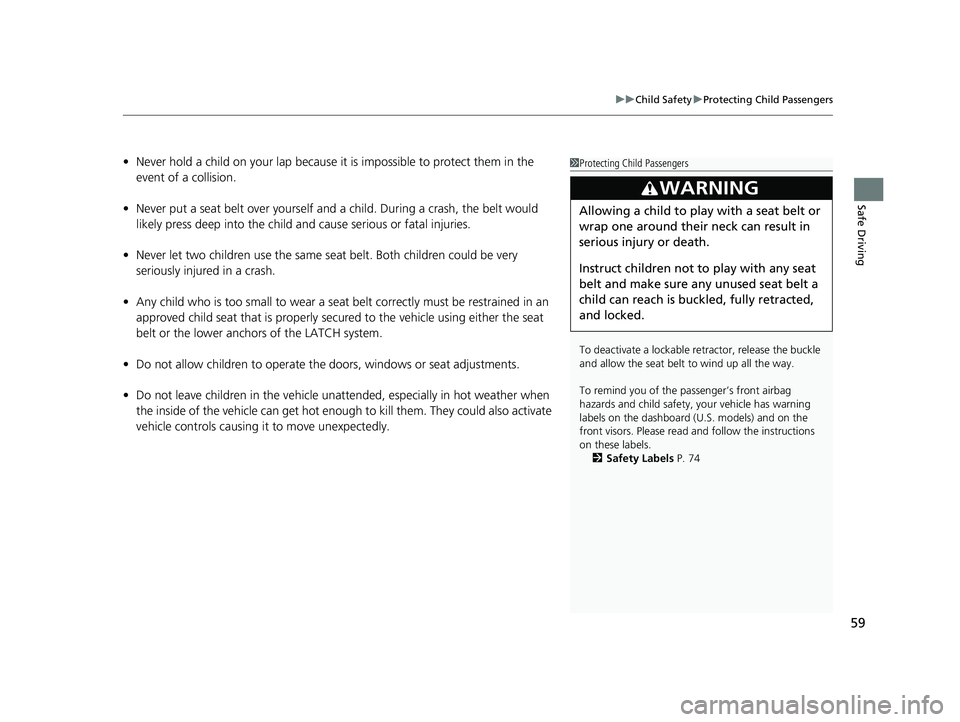
59
uuChild Safety uProtecting Child Passengers
Safe Driving
• Never hold a child on your lap because it is impossible to protect them in the
event of a collision.
• Never put a seat belt over yourself and a child. During a crash, the belt would
likely press deep into the child and cause serious or fatal injuries.
• Never let two children use the same seat belt. Both children could be very
seriously injured in a crash.
• Any child who is too small to wear a seat belt correctly must be restrained in an
approved child seat that is properly secu red to the vehicle using either the seat
belt or the lower anchors of the LATCH system.
• Do not allow children to operate the doors, windows or seat adjustments.
• Do not leave children in the vehicle unattended, especially in hot weather when
the inside of the vehicle can get hot enough to kill them. They could also activate
vehicle controls causing it to move unexpectedly.1Protecting Child Passengers
To deactivate a lockable retractor, release the buckle
and allow the seat belt to wind up all the way.
To remind you of the pa ssenger’s front airbag
hazards and child safety, your vehicle has warning
labels on the dashboard (U.S. models) and on the
front visors. Please read and follow the instructions
on these labels. 2 Safety Labels P. 74
3WARNING
Allowing a child to play with a seat belt or
wrap one around their neck can result in
serious injury or death.
Instruct children not to play with any seat
belt and make sure any unused seat belt a
child can reach is buckled, fully retracted,
and locked.
20 PASSPORT-31TGS6100.book 59 ページ 2019年8月30日 金曜日 午後6時22分
Page 62 of 667
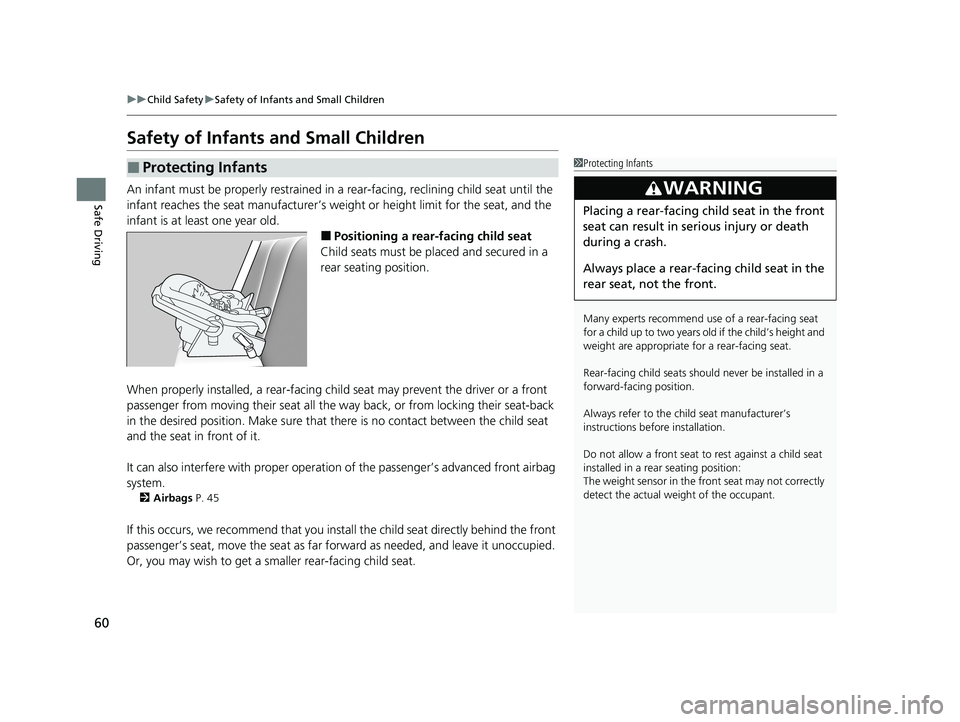
60
uuChild Safety uSafety of Infants and Small Children
Safe Driving
Safety of Infants and Small Children
An infant must be properly restrained in a rear-facing, reclining child seat until the
infant reaches the seat manufacturer’s weig ht or height limit for the seat, and the
infant is at least one year old.
■Positioning a rear-facing child seat
Child seats must be placed and secured in a
rear seating position.
When properly installed, a rear-facing child seat may prevent the driver or a front
passenger from moving their seat all the way back, or from locking their seat-back
in the desired position. Make sure that th ere is no contact between the child seat
and the seat in front of it.
It can also interfere with pr oper operation of the passenger’s advanced front airbag
system.
2 Airbags P. 45
If this occurs, we recommend that you install the child seat directly behind the front
passenger’s seat, move the seat as far fo rward as needed, and leave it unoccupied.
Or, you may wish to get a sm aller rear-facing child seat.
■Protecting Infants1Protecting Infants
Many experts recommend us e of a rear-facing seat
for a child up to two years ol d if the child’s height and
weight are appropriate for a rear-facing seat.
Rear-facing child seats should never be installed in a
forward-facing position.
Always refer to the child seat manufacturer’s
instructions before installation.
Do not allow a front seat to rest against a child seat
installed in a rear seating position:
The weight sensor in the fr ont seat may not correctly
detect the actual weight of the occupant.
3WARNING
Placing a rear-facing child seat in the front
seat can result in serious injury or death
during a crash.
Always place a rear-fac ing child seat in the
rear seat, not the front.
20 PASSPORT-31TGS6100.book 60 ページ 2019年8月30日 金曜日 午後6時22分
Page 63 of 667
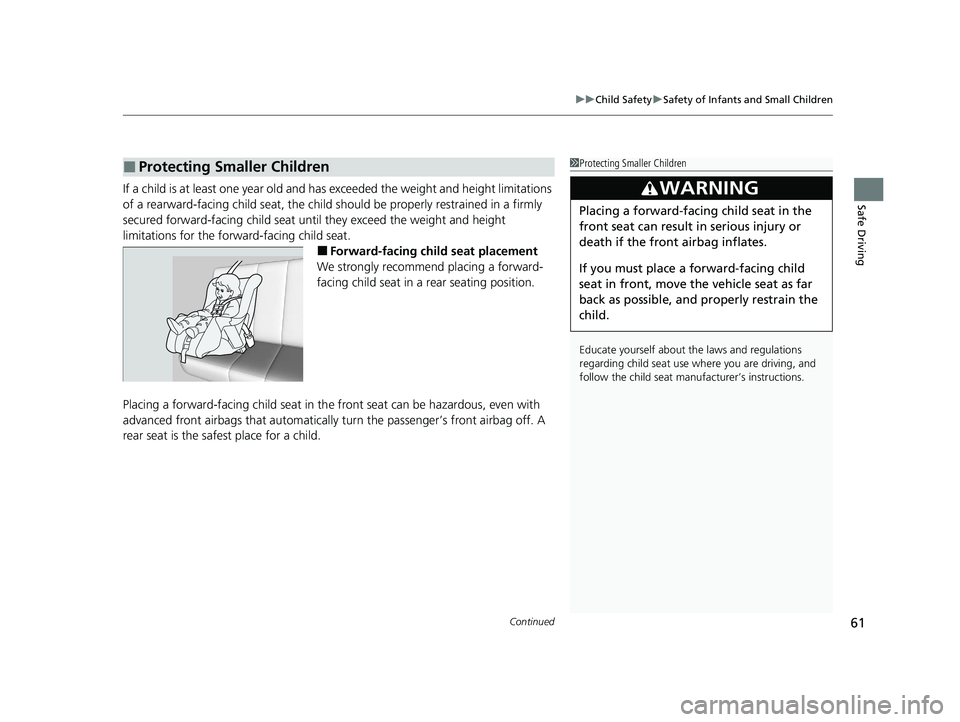
Continued61
uuChild Safety uSafety of Infants and Small Children
Safe DrivingIf a child is at least one year old and has exceeded the weight and height limitations
of a rearward-facing child seat, the child should be properly restrained in a firmly
secured forward-facing child seat until they exceed the weight and height
limitations for the forward-facing child seat.
■Forward-facing child seat placement
We strongly recommend placing a forward-
facing child seat in a rear seating position.
Placing a forward-facing child seat in th e front seat can be hazardous, even with
advanced front airbags that automatically turn the passeng er’s front airbag off. A
rear seat is the safest place for a child.
■Protecting Smaller Children1 Protecting Smaller Children
Educate yourself about th e laws and regulations
regarding child seat use wh ere you are driving, and
follow the child seat manufacturer’s instructions.
3WARNING
Placing a forward-facing child seat in the
front seat can result in serious injury or
death if the front airbag inflates.
If you must place a forward-facing child
seat in front, move the vehicle seat as far
back as possible, and properly restrain the
child.
20 PASSPORT-31TGS6100.book 61 ページ 2019年8月30日 金曜日 午後6時22分
Page 64 of 667
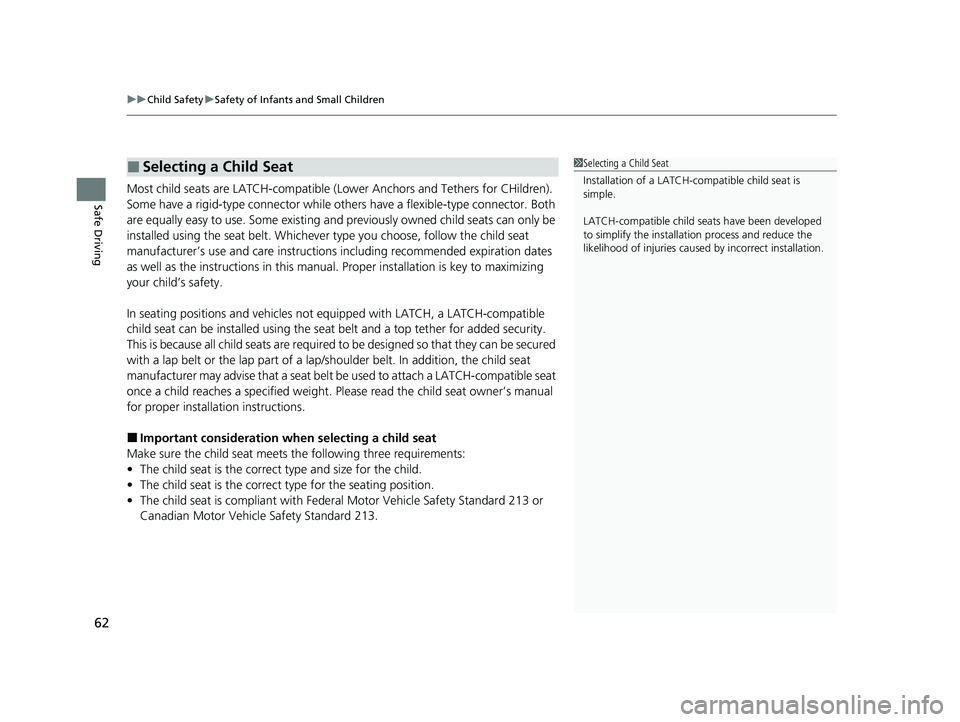
uuChild Safety uSafety of Infants and Small Children
62
Safe DrivingMost child seats are LATCH-compatible (L ower Anchors and Tethers for CHildren).
Some have a rigid-type conn ector while others have a flexible-type connector. Both
are equally easy to use. Some existing and previously owned child seats can only be
installed using the seat belt. Whichever type you choose, follow the child seat
manufacturer’s use and care instructions including recommended expiration dates
as well as the instructions in this manual. Proper installation is key to maximizing
your child’s safety.
In seating positions and vehicles not equipped with LATCH, a LATCH-compatible
child seat can be installed using the seat belt and a top tether for added security.
This is because all child seats are required to be designed so that they can be secured
with a lap belt or the lap part of a lap/sh oulder belt. In addition, the child seat
manufacturer may advise that a seat belt be used to attach a LATCH-compatible seat
once a child reaches a specified weight. Please read the child seat owner’s manual
for proper installation instructions.
■Important consideration wh en selecting a child seat
Make sure the child seat meets th e following three requirements:
• The child seat is the correct type and size for the child.
• The child seat is the correct type for the seating position.
• The child seat is compliant with Federa l Motor Vehicle Safety Standard 213 or
Canadian Motor Vehicle Safety Standard 213.
■Selecting a Child Seat1 Selecting a Child Seat
Installation of a LATCH-compatible child seat is
simple.
LATCH-compatible child s eats have been developed
to simplify the installati on process and reduce the
likelihood of injuries caused by incorrect installation.
20 PASSPORT-31TGS6100.book 62 ページ 2019年8月30日 金曜日 午後6時22分
Page 65 of 667

63
uuChild Safety uSafety of Infants and Small Children
Continued
Safe DrivingA LATCH-compatible child seat can be insta lled in the rear seats. A child seat is
attached to the lower anchors with either the rigid or flexible type of connectors.
1. Locate the lower anchors under the marks.
■Installing a LATCH-Compatible Child Seat
Marks
20 PASSPORT-31TGS6100.book 63 ページ 2019年8月30日 金曜日 午後6時22分
Page 66 of 667

64
uuChild Safety uSafety of Infants and Small Children
Safe Driving
2. Place the child seat on the vehicle seat, then
attach the child seat to the lower anchors
according to the instructions that came
with the child seat.
u When installing the child seat, make sure
that the lower anchors are not
obstructed by the seat belt or any other
object.
Rigid Type
Lower
Anchors
Flexible Type
Lower
Anchors
20 PASSPORT-31TGS6100.book 64 ページ 2019年8月30日 金曜日 午後6時22分
Page 67 of 667
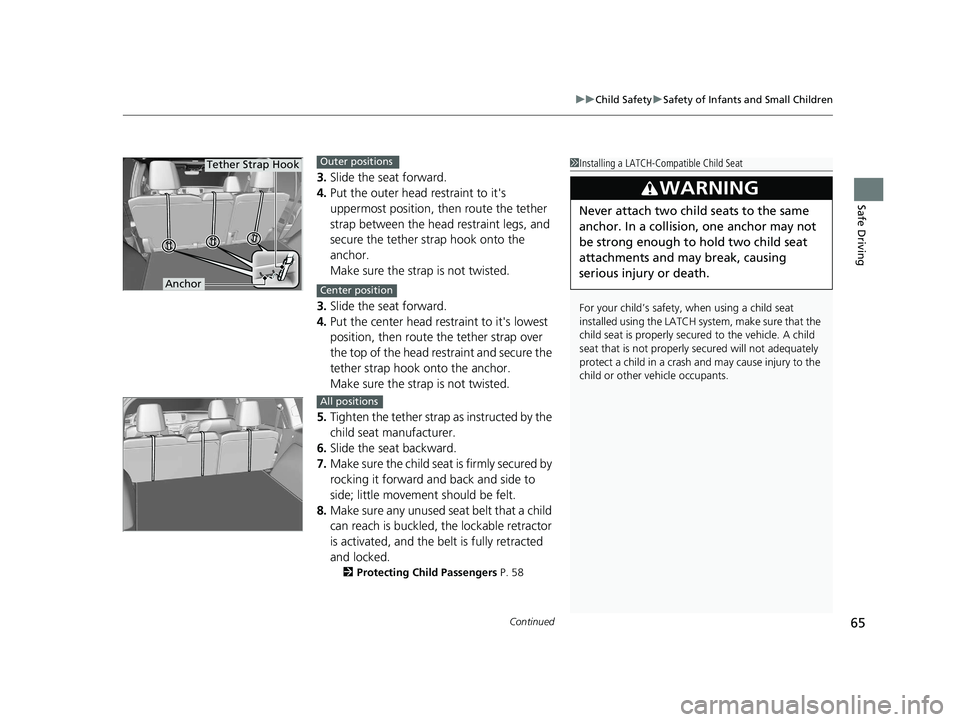
Continued65
uuChild Safety uSafety of Infants and Small Children
Safe Driving
3. Slide the seat forward.
4. Put the outer head restraint to it's
uppermost position, then route the tether
strap between the head restraint legs, and
secure the tether strap hook onto the
anchor.
Make sure the strap is not twisted.
3. Slide the seat forward.
4. Put the center head restraint to it's lowest
position, then route the tether strap over
the top of the head restraint and secure the
tether strap hook onto the anchor.
Make sure the strap is not twisted.
5. Tighten the tether strap as instructed by the
child seat manufacturer.
6. Slide the seat backward.
7. Make sure the child seat is firmly secured by
rocking it forward and back and side to
side; little movement should be felt.
8. Make sure any unused seat belt that a child
can reach is buckled, the lockable retractor
is activated, and the be lt is fully retracted
and locked.
2 Protecting Child Passengers P. 58
1Installing a LATCH-Compatible Child Seat
For your child’s safety, when using a child seat
installed using the LATCH system, make sure that the
child seat is properly secured to the vehicle. A child
seat that is not properly secured will not adequately
protect a child in a crash and may cause injury to the
child or other vehicle occupants.
3WARNING
Never attach two child seats to the same
anchor. In a collision, one anchor may not
be strong enough to hold two child seat
attachments and may break, causing
serious injury or death.
Tether Strap Hook
Anchor
Outer positions
Center position
All positions
20 PASSPORT-31TGS6100.book 65 ページ 2019年8月30日 金曜日 午後6時22分
Page 68 of 667
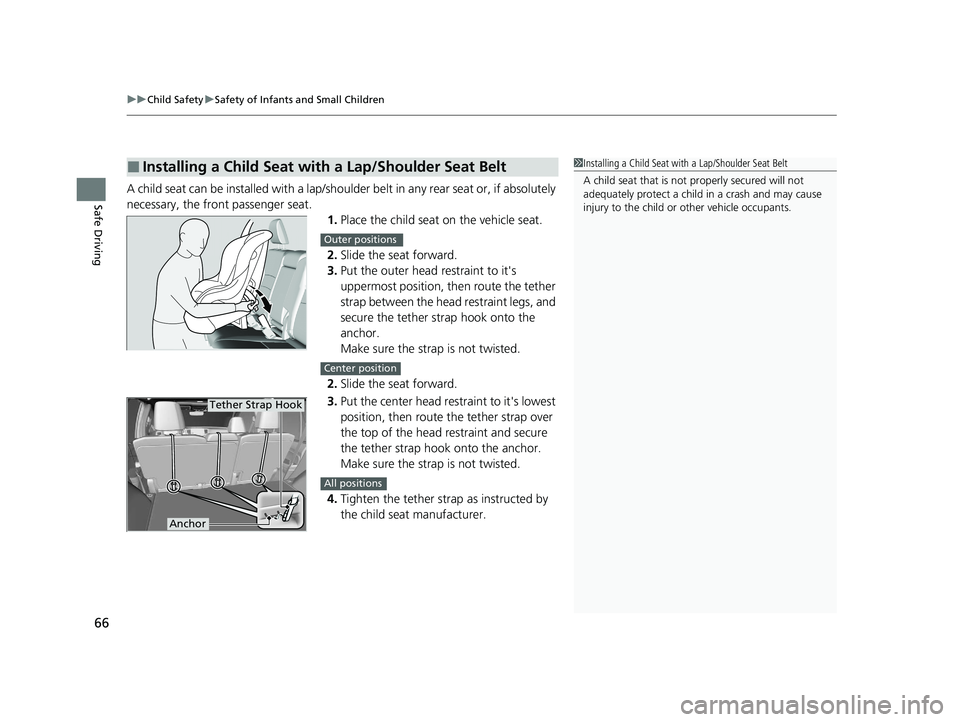
uuChild Safety uSafety of Infants and Small Children
66
Safe DrivingA child seat can be installed with a lap/should er belt in any rear seat or, if absolutely
necessary, the front passenger seat. 1.Place the child seat on the vehicle seat.
2. Slide the seat forward.
3. Put the outer head restraint to it's
uppermost position, then route the tether
strap between the head restraint legs, and
secure the tether strap hook onto the
anchor.
Make sure the strap is not twisted.
2. Slide the seat forward.
3. Put the center head restraint to it's lowest
position, then route the tether strap over
the top of the head restraint and secure
the tether strap hook onto the anchor.
Make sure the strap is not twisted.
4. Tighten the tether strap as instructed by
the child seat manufacturer.
■Installing a Child Seat with a Lap/Shoulder Seat Belt1Installing a Child Seat with a Lap/Shoulder Seat Belt
A child seat that is not properly secured will not
adequately protect a child in a crash and may cause
injury to the child or other vehicle occupants.
Outer positions
Center position
Tether Strap Hook
Anchor
All positions
20 PASSPORT-31TGS6100.book 66 ページ 2019年8月30日 金曜日 午後6時22分
Page 69 of 667
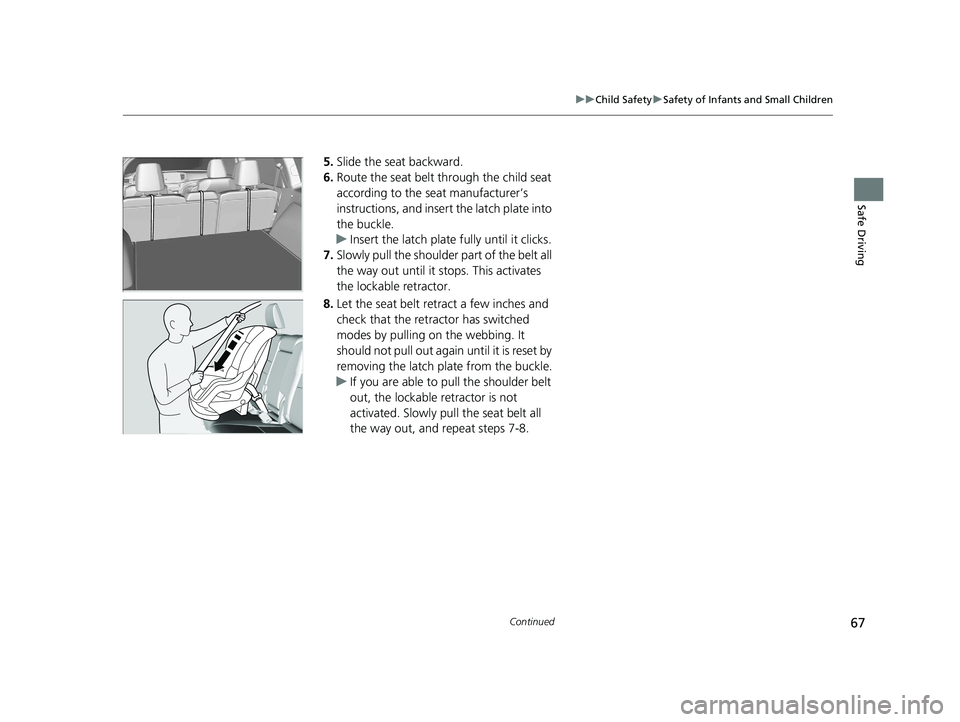
67
uuChild Safety uSafety of Infants and Small Children
Continued
Safe Driving
5. Slide the seat backward.
6. Route the seat belt through the child seat
according to the seat manufacturer’s
instructions, and insert the latch plate into
the buckle.
u Insert the latch plate fu lly until it clicks.
7. Slowly pull the shoulder part of the belt all
the way out until it stops. This activates
the lockable retractor.
8. Let the seat belt retract a few inches and
check that the retractor has switched
modes by pulling on the webbing. It
should not pull out again until it is reset by
removing the latch plate from the buckle.
u If you are able to pull the shoulder belt
out, the lockable retractor is not
activated. Slowly pull the seat belt all
the way out, and repeat steps 7-8.
20 PASSPORT-31TGS6100.book 67 ページ 2019年8月30日 金曜日 午後6時22分
Page 70 of 667
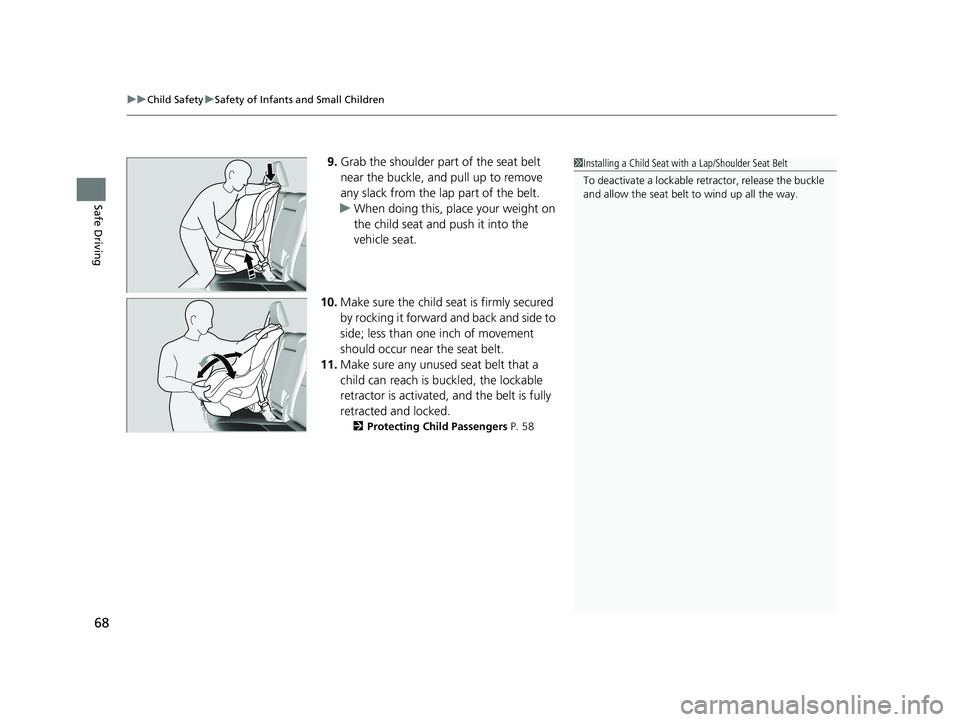
uuChild Safety uSafety of Infants and Small Children
68
Safe Driving
9. Grab the shoulder part of the seat belt
near the buckle, and pull up to remove
any slack from the lap part of the belt.
u When doing this, place your weight on
the child seat and push it into the
vehicle seat.
10. Make sure the child seat is firmly secured
by rocking it forward and back and side to
side; less than one inch of movement
should occur near the seat belt.
11. Make sure any unused seat belt that a
child can reach is buckled, the lockable
retractor is activated, and the belt is fully
retracted and locked.
2Protecting Child Passengers P. 58
1Installing a Child Seat with a Lap/Shoulder Seat Belt
To deactivate a lockable retractor, release the buckle
and allow the seat belt to wind up all the way.
20 PASSPORT-31TGS6100.book 68 ページ 2019年8月30日 金曜日 午後6時22分